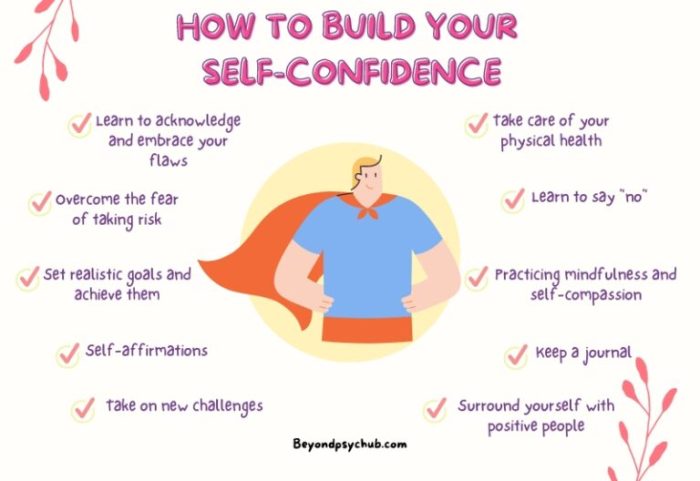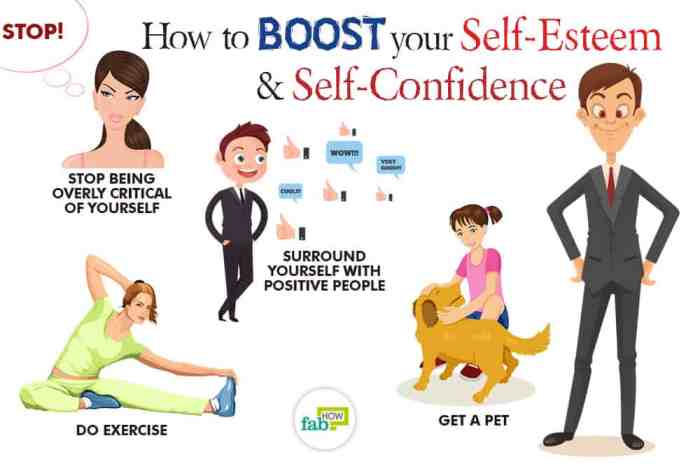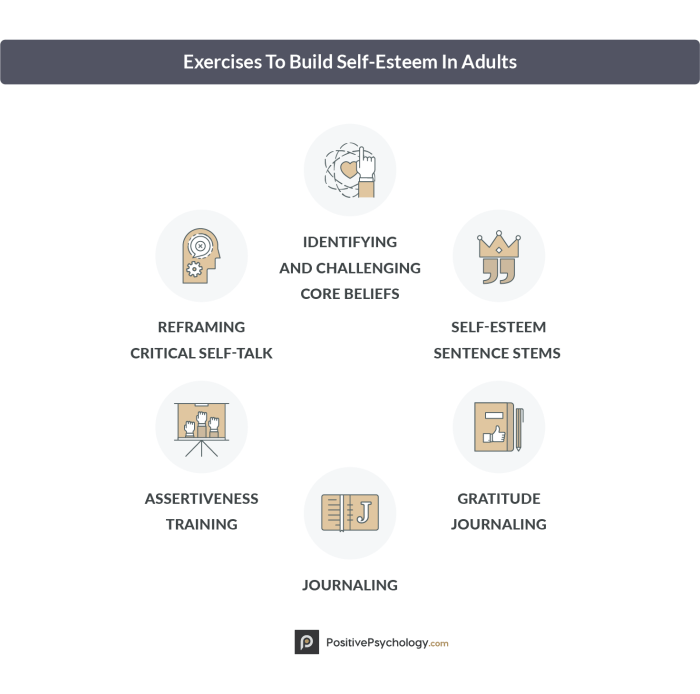Embark on a journey to enhance your self-esteem with ‘How to Build Self-Esteem: 20 Tips for Confidence and Self-Love’. Dive into practical strategies and insightful discussions that will empower you to cultivate a positive self-image and embrace self-love.
Explore the intricacies of building self-esteem, understanding its impact on mental health, and nurturing self-love through actionable tips and exercises.
Understanding Self-Esteem

Self-esteem is the overall opinion we have of ourselves and our abilities. It plays a crucial role in our daily lives as it influences our thoughts, feelings, and behaviors. Having healthy self-esteem allows us to navigate through challenges, handle stress, and maintain positive relationships.
Self-Esteem vs. Self-Confidence
Self-esteem is more about how we feel about ourselves on a deeper level, while self-confidence is about our belief in our abilities to succeed in specific situations. For example, someone with high self-esteem may believe they are deserving of love and respect, while self-confidence comes into play when they are faced with a task like public speaking.
Impact on Mental Health
Low self-esteem can have a significant impact on mental health, leading to feelings of worthlessness, anxiety, and depression. For instance, someone with low self-esteem may constantly criticize themselves, engage in negative self-talk, and avoid social interactions due to fear of rejection.
Building Self-Esteem: Practical Tips

Building self-esteem is crucial for overall well-being and confidence. Here are 10 actionable tips to help boost self-esteem:
1. Practice Self-Care
- Make time for activities that make you feel good.
- Develop healthy habits like exercising and eating well.
- Get enough rest and prioritize your mental health.
2. Set Realistic Goals
- Break down big goals into smaller, achievable tasks.
- Celebrate your progress, no matter how small.
- Focus on what you can control and adjust expectations accordingly.
3. Surround Yourself with Positive People
- Avoid toxic relationships and seek support from those who uplift you.
- Connect with friends and family who appreciate and encourage you.
4. Challenge Negative Thoughts
- Acknowledge negative self-talk and replace it with positive affirmations.
- Practice gratitude and focus on your strengths and accomplishments.
5. Learn from Mistakes
- View failures as opportunities for growth and learning.
- Forgive yourself and move forward with valuable lessons in mind.
6. Step Out of Your Comfort Zone
- Try new things and embrace new experiences.
- Build confidence by facing challenges and overcoming fears.
7. Accept Imperfections
- Understand that nobody is perfect and embrace your flaws.
- Celebrate your uniqueness and focus on self-acceptance.
8. Practice Self-Compassion
- Be kind to yourself and treat yourself with the same compassion you offer others.
- Acknowledge your feelings without judgment and practice self-acceptance.
9. Seek Professional Help
- Consider therapy or counseling to work through deep-rooted issues affecting self-esteem.
- Consult with a mental health professional for personalized support and guidance.
10. Celebrate Your Achievements
- Recognize and celebrate your accomplishments, no matter how small.
- Reflect on your progress and give yourself credit for your hard work.
Significance of Self-Compassion in Building Self-Esteem
Self-compassion plays a crucial role in building self-esteem by fostering a sense of self-acceptance and kindness towards oneself. When you practice self-compassion, you are more forgiving of your mistakes, more understanding of your shortcomings, and more supportive of your own well-being. This compassionate attitude towards yourself helps boost self-esteem and resilience in the face of challenges.
Strategies for Overcoming Self-Doubt and Negative Self-Talk
Negative self-talk and self-doubt can be detrimental to self-esteem. Here are some strategies to help overcome them:
- Challenge negative thoughts with evidence and logic.
- Replace negative self-talk with positive affirmations and realistic self-appraisals.
- Practice mindfulness and self-awareness to catch and reframe negative patterns of thinking.
- Seek feedback from trusted sources to gain a more balanced perspective on yourself.
Nurturing Self-Love

Self-love plays a crucial role in building self-esteem, as it involves accepting and appreciating oneself unconditionally. When you have a strong sense of self-love, it becomes easier to value your worth and capabilities, leading to increased confidence and self-assurance.
Exercises for Practicing Self-Love and Acceptance
- Practice self-care rituals: Take time to prioritize your physical, emotional, and mental well-being through activities like exercise, meditation, or spending time doing things you love.
- Practice positive affirmations: Replace negative self-talk with positive affirmations to cultivate a more compassionate and encouraging inner dialogue.
- Set boundaries: Learn to say no to things that drain your energy or compromise your values, and surround yourself with people who respect and support you.
- Forgive yourself: Let go of past mistakes and practice self-forgiveness to move forward with a lighter heart and a greater sense of self-compassion.
The Role of Setting Boundaries in Cultivating Self-Love
Setting boundaries is essential in cultivating self-love because it helps you establish healthy relationships and prioritize your well-being. By setting clear boundaries, you communicate your needs and values to others, preventing feelings of resentment or overwhelm. Boundaries also reinforce self-respect and self-worth, showing that you value yourself enough to protect your emotional and mental health.
Final Wrap-Up

Elevate your self-worth and confidence after delving into ‘How to Build Self-Esteem: 20 Tips for Confidence and Self-Love’. Take charge of your journey towards self-acceptance and empowerment.